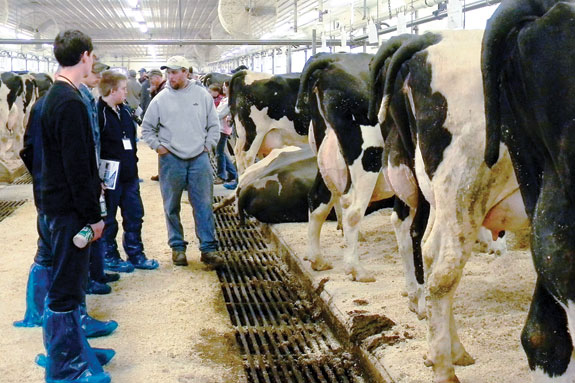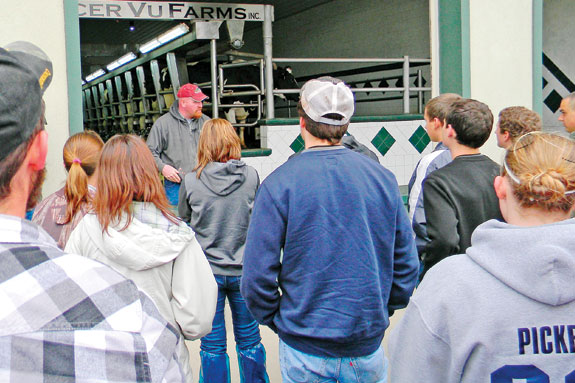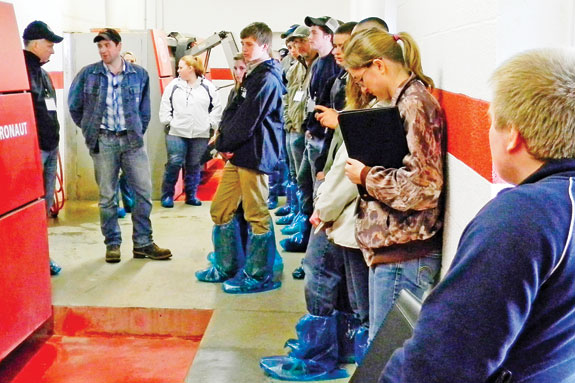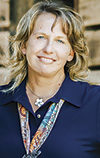The success of any family business depends on one generation’s ability to develop the next. It doesn’t matter if your business is a small 60-cow tiestall facility in Pennsylvania or a 4,500-cow operation in Idaho; that business can only continue as long as there is someone there who can and is able to manage it.
Late last fall, the Center for Dairy Excellence surveyed the Pennsylvania dairy farm community to assess projected future dairy trends.
The survey asked how many of the respondents currently active in dairy plan to continue dairying into 2017.
Only 78 percent of those active dairies surveyed said they plan to stay in the business until then. Ten percent of those who indicated they plan to exit did not have a successor for their business.
Also last year, a separate survey from the Elizabethtown College Department of Business and the S. Dale High Center for Family Business assessed confidence levels of 278 small businesses in the Lancaster County region of southeast Pennsylvania.
About 61 percent of the businesses surveyed were dairy farms. This survey clearly indicated that having that next generation in place is a concern for many small businesses, especially dairy farms.
Only 15 percent of the dairy producers surveyed in the Elizabethtown College analysis were concerned about the managerial competence of the next generation taking over the business. However, more than 60 percent of them indicated they were concerned about the lack of interest the next generation has in dairying.
So when you consider your family dairy enterprise, how closely do these statistics align with your business? What are you doing today to develop that next generation on your dairy?
Having a written transition plan is critical to any successful business transfer. However, developing that next generation begins long before any transition plan is written. It begins with what our children – and the other young people close to us – see and hear when they are around our dairy farms.
Recently the Center for Dairy Excellence Foundation of Pennsylvania took 20 high school students on a tour of three dairy farms located in south-central Pennsylvania.
The tour was part of the Center Foundation’s new “Dairy Leaders of Tomorrow” platform, which is a curriculum-based tool that provides dairy business training to high school students considering dairying as a future profession.
The three dairies were very different. The first farm they visited was a 120-cow tiestall facility built about eight years ago that is currently achieving 113 pounds per day in milk production.
The second was an 1,800-cow freestall operation with a mechanized sand separator, group calf housing facility and a very innovative business model. The third was a 240-cow freestall barn with five Lely robotic milkers, a robotic feed pusher and a very hands-off business model.
The three dairies could not have been more different, but the one thing they all had in common was an older generation that was willing to invest time and resources into developing the next generation.

And it was very evident that their investment was paying off in the success of their business.
At all three operations, the tour guides represented that next generation.
Chris Flannery from Roaring Creek Dairy in Mercersburg, Pennsylvania, was managing the tiestall facility with his father, Michael, and brother, David.
The two sons were in their mid- to late-30s and were responsible for many of the changes that

had contributed to the dairy’s exceptionally high milk production level.
Rod Hissong, also in his mid-30s, manages Mercer Vu in Mercersburg with his brother, Rick.
Their father, Ron, was milking 110 cows on the farm when Rick came back from college in 1993 and ever since has been transitioning management of the business to the boys, who have grown it to be one of the largest dairies in Pennsylvania.
Randall Martin and his father, Faron, operate

Railside Dairy in Shippensburg, Pennsylvania.
Over the past five years, Faron has grown his custom operating business and turned management of the dairy over to his son.
About two years ago, Randall moved his cows from a parlor to the new robotic milking facility.
The students had the opportunity to see some very innovative facilities during the tour.
But probably the most beneficial part of their experience was not what they saw, but what they heard at each stop.
Here is just some of the advice they received that day which may be insightful even to those who aren’t new to the business.
1. Step outside your comfort zone. “We were milking in an outdated parlor and wanted to remodel,” Chris told the group. “We went on a dairy tour, and when we got to the tiestall facility, I didn’t even want to get off the bus. But once my dad made me, I was just sold on how the cows looked and how well they were doing.”
2. Encourage your kids. “I wasn’t sure if I wanted to come back to farm when I was your age,” Rod told the students. “But when I was a freshman in college, my brother came back, and Dad started letting him make some changes, like pulling the tin off the freestall barn for improved ventilation. It got me excited about what we could do here.”
3. Pencil it out together. “When I looked at how many robots I wanted, I realized that I could produce enough milk to fill a tractor-trailer load every other day if I installed five robotic milkers,” Randall said. “We already had the cows coming on line, and I would have to sell some if we only installed four, and I figured out I could save significantly by marketing a trailer load of milk.”
4. Maximize what you have. “The parlor is our biggest fixed cost on the farm, so we started milking four times a day to spread that cost out over more units,” Rod explained. “We also started raising our bull calves as steers to about 400 pounds because we built the new calf barn and our calf managers are going to be there anyway, so it spreads our costs over more units.“
5. Don’t be penny wise and pound foolish. “We purchased an evaporative cooler for our tiestall barn during a low-price year, and it wasn’t cheap,” Chris said. “But in that first year, we figured out we paid for it very quickly just having that consistent milk production throughout the summer.”
6. Figure out what works for you. “I was having trouble with my help in the parlor. They wanted off work when I wanted off work, and my dad wanted to do other things,” Randall said. “I started looking hard at how I could manage the dairy on my own. That’s when robotics started to look very favorable.”
7. Never say never. “A few years ago, I would have said we would never haul our own milk. I just thought: ‘We are not in the hauling business; we’re in the milking business,’” Rod reflected. “But then the regulations changed a bit, and I realized if I hired one full-time driver, I could cut my hauling costs in half.”
8. Be a model for your kids. “You know, my dad and granddad always had high herd averages, and they seemed to enjoy what they were doing,” Chris said. “It was really something that got in my blood, and I wouldn’t be here if it wasn’t for them.”
The Dairy Leaders Tour offered a chance for the students to see three different yet successful dairy farm business models. It exposed the students to positive-minded, innovative dairy producers who are excited about the future of their dairy business.
What the students took back to their own farms and futures was invaluable insight on the opportunities that exist on today’s dairy farm businesses.
As our industry looks to develop the next generation of dairy farm business owners and managers, offering opportunities like the Dairy Leaders Tour will help get young people excited about the possibilities that exist in this industry.
But that excitement has to start at home – with what you say and do to demonstrate to your own children, whether they’re 15 or 35, why you’re excited about the future of your dairy. PD
PHOTOS
TOP RIGHT: Twenty high school students and their chaperones traveled to three Franklin County, Pennsylvania, dairy farms as part of the Dairy Leaders of Tomorrow tour.
FIRST MIDDLE RIGHT: David Flannery, who operates a 120-tiestall facility with his brother, Chris, and father, David, showed students how comfortable the cows are kept.
SECOND MIDDLE RIGHT: Rod Hissong welcomed students to Mercer Vu Farms and shared what gets him energized about being in dairy.
BOTTOM RIGHT: Randall Martin gave the students time to watch how the robotic milkers operate, which was a highlight of the day. Photos courtesy of Jayne Sebright.

Jayne Sebright
Communications Director
Center for Dairy Excellence






